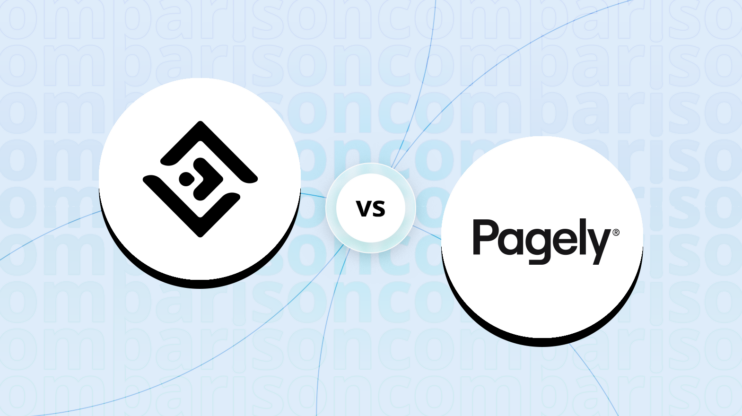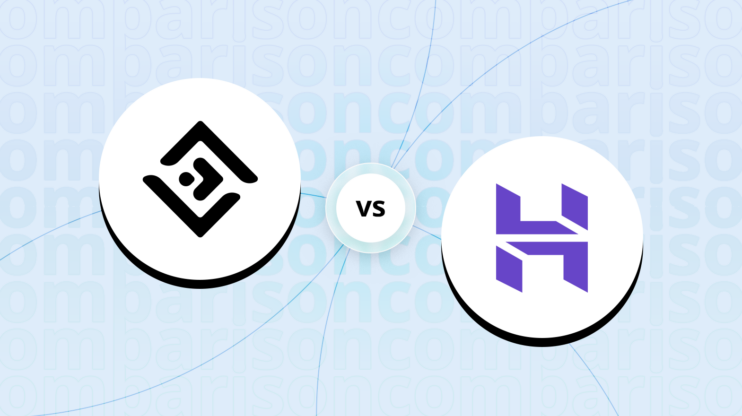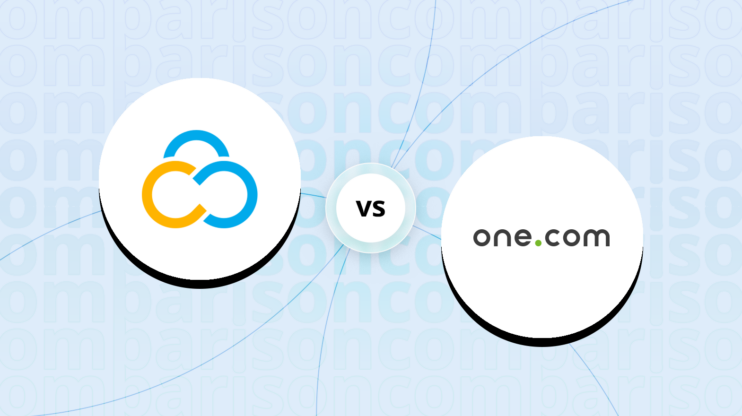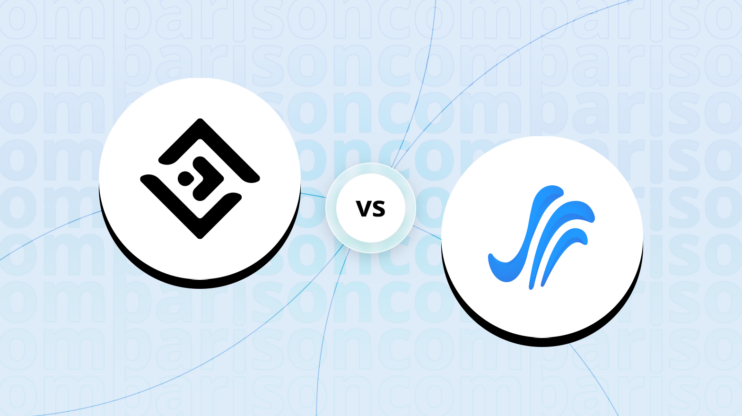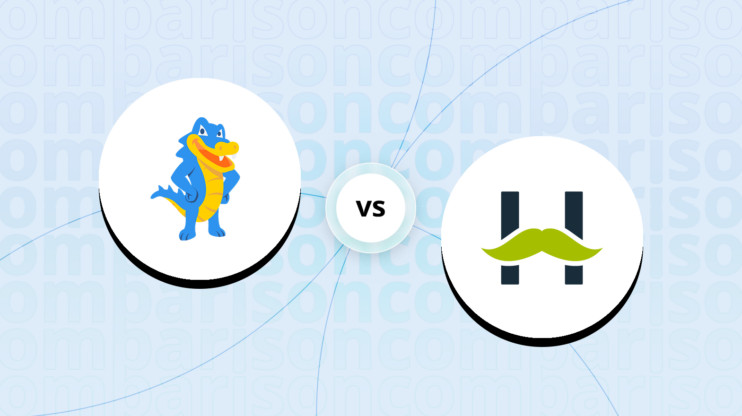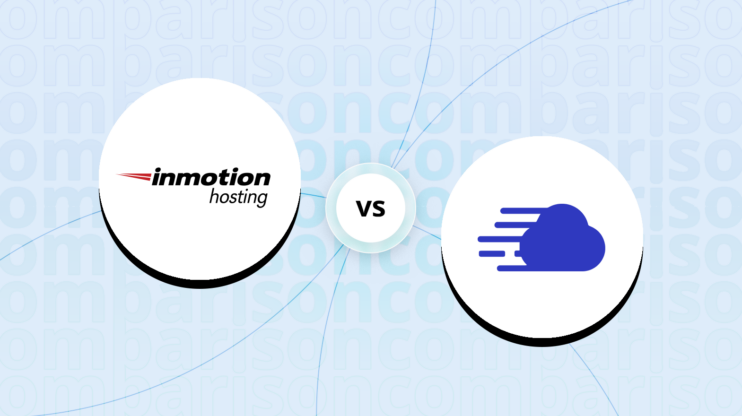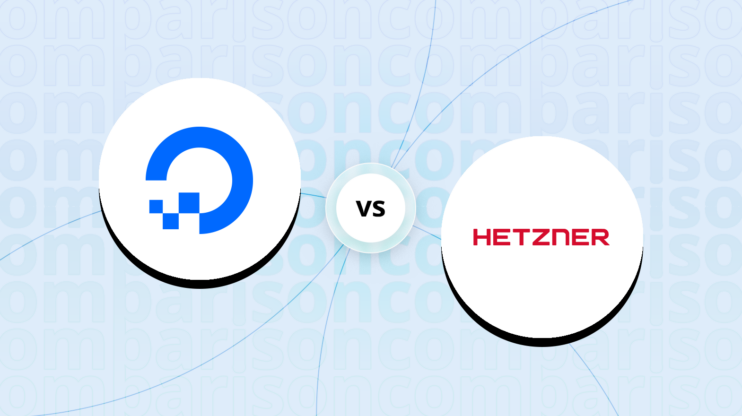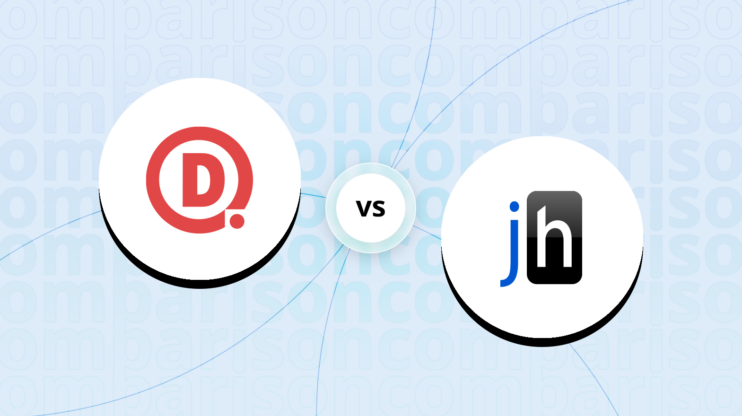Final verdict
Looking over Hostinger vs. Pagely, it’s clear why both hosts are so popular. They have both hosted millions of
websites that run on WordPress for decades, building up a loyal customer base.
Pagely (Overall grade: 8.1)
leverages Amazon AWS infrastructure to offer high-performance and scalable solutions tailored for enterprise-level requirements. It excels in handling high-traffic and multimedia-rich websites, providing advanced features such as multi-region redundancy, superior uptime, and rapid response times. The platform is ideal for agencies and large businesses needing significant resource flexibility, security compliance (including HIPAA and PCI standards), and managed DevOps support. The higher cost is justified by the premium services, expert support, and extensive security measures, though these features might be excessive for smaller-scale users or those on a strict budget.
Hostinger (Overall grade: 8.7)
combines affordability with a broad array of features, making it an appealing choice for small to medium-sized businesses, beginners, and budget-conscious users. Its standout strengths include impressive website speed due to NVMe storage, LiteSpeed web servers, and the LSCWP cache plugin, as well as a user-friendly hPanel control panel that simplifies management tasks. Hostinger also offers competitive pricing, scalability, and robust security features, including advanced DDoS protection and daily backups. However, it lacks dedicated hosting options and more advanced staging environments, which might be necessary for larger enterprises or complex web applications.
 Overall grade:8.7 |
 Overall grade:8.1 |
|
|---|---|---|
| Uptime and Availability | 9.2 | 9.5 |
| Hosting Performance | 9.0 | 8.8 |
| Hosting Security | 8.4 | 9.2 |
| Price | 8.8 | 7.4 |
| Hosting Features | 8.3 | 4.6 |
| Ease Of Setup | 9.0 | 8.2 |
| User Management | 8.2 | 8.4 |
| Customer Support | 8.3 | 8.9 |
| User feedback | 4.4/5 | 4.9/5 |
Hosting types offered
Both platforms provide a variety of hosting types, each designed to meet the different needs of users.
 |
 |
|
|---|---|---|
| Shared hosting | ||
| Cloud hosting | ||
| WordPress hosting | ||
| Ecommerce hosting | ||
| VPS hosting | ||
| Dedicated hosting |
Although both offer a variety of hosting plans tailored to different needs, in
certain cases, one platform may prove to be more suitable.
Detailed comparison
Uptime and availability
Evaluates the average uptime statistics, uptime guarantee and overall availability of the hosting
provider
Score Components:
- Uptime percentage (30%): evaluates the uptime statistics in given period of time
- Uptime guarantee (20%): Assesses if the platform offers an uptime guarantee and
whether the actual uptime matches the promised guarantee. - General performance (25%): Evaluates how fast is the average response time and overall
it’s stability. - Responsiveness (10%): Adaptability to different devices and screen sizes.
- Availability (25%): Reflects the total downtime and number of outages.
 9.2
9.2
 9.5
9.5
🏆 Winner
Pagely: Superior uptime, advanced features, and rapid response times set Pagely apart.

Pagely guarantees an impressive 99.99% uptime, reinforced by high availability architecture and multi-region redundancy. The average response time of 211ms further highlights its performance capabilities. Pagely’s disaster recovery and emergency fallback options ensure minimal downtime during incidents.

Hostinger, with a 99.9% uptime guarantee and an average uptime of 99.97%, provides reliable service and maintained a perfect 100% uptime for 10 weeks in tests. Hostinger offers DDoS protection, web application firewalls, and a global network of data centers to minimize latency. Despite its high performance, Pagely’s features and performance make it the superior choice.
Hosting performance
Score Components:
- Hosting speed (30%): This includes SSD quality, Load times, PageSpeed score ranges,
additional information on website speed, built-in plugins for performance enhancement, available caching
methods, and CPU/RAM options - CDN (20%): Considers whether CDN is available or not, whether it’s free or paid, and
the quality of the CDN service - Available data centers (30%): Evaluates the number of data centers and their locations
globally. - Scalibility (20%): Looks at whether elastic scaling is available, the process required
to scale (manual upgrade vs. automatic scaling), the presence of dedicated servers, and the costs
associated with scaling.
 9.0
9.0
 8.8
8.8
🏆 Winner: Hostinger Hostinger offers exceptional performance, speed, and value for money, making it a standout choice among web hosting providers.
Hostinger’s hosting speed benefits from NVMe storage, LiteSpeed web servers, and the LSCWP cache plugin, providing 4X faster load times. Its global data centers are spread across Europe, Asia, North America, and South America, enhancing delivery speed. Hostinger includes a free CDN with code minification and automatic image optimization, boosting website speed by up to 40%. Pagely, while also offering advanced speed and SSD storage through Amazon AWS, comes at a much higher price, starting at $375/month. Both services provide excellent caching and security features, but Hostinger’s widespread data centers offer superior global reach.
Website Speed
Hostinger ensures rapid website loading times with its high-speed CPUs, a significant amount of RAM, and NVMe storage. The use of LiteSpeed web servers and the LSCWP cache plugin dramatically cuts down response times. Moreover, Hostinger’s HTTP/3 and IPv6 protocols minimize latency, providing a consistent 99.9% uptime guarantee. Pagely’s higher cost plans offer stable performance with its managed WordPress upgrades and superior caching, but Hostinger’s integrated speed-enhancing features make it the go-to for fast, cost-effective hosting.
Scalability
Both Hostinger and Pagely offer scalable solutions, but they approach it differently. Hostinger provides straightforward plan upgrades that automatically accommodate increased traffic and resource needs, with capped prices. Plans range from $9.99/month to $29.99/month, making it affordable to scale. Pagely offers custom scalability with its high-tier plans, featuring flexible configurations and dedicated resources, but at a much steeper cost of up to $2500/month. Hostinger’s clear, tiered scaling options make it easier and budget-friendly for most businesses to adapt as they grow.
Hosting security
and regulatory requirements
Score Components:
- Technical security measures (40%): This includes encryption, firewalls, DDoS
protection, secure configurations, server monitoring, access control and availability of security addons
(e.g Sitelock security). - Operational security measures (30%): Encompasses data privacy, backups and data
redundancy. - Compliance and certifications (20%): Adherence to legal and regulatory requirements
(e.g., GDPR, HIPAA) and possession of certifications (e.g., ISO 27001, SOC 2). - Business and reliability (10%): Factors in the provider’s reputation, uptime
guarantees, and customer support.
 8.4
8.4
 9.2
9.2
🏆 Winner Pagely: Offering a robust security framework with extensive support for compliance and advanced security measures.
Both Hostinger and Pagely, have notable differences in their approaches to technical and operational
security, as well as in their compliance with regulations.
Technical security measures:
Hostinger provides 24/7 server monitoring, firewall protection, advanced security modules, and anti-malware protection. Pagely matches these with AWS Shield Standard DDoS protection, a proprietary web application firewall, and real-time malware scanning. Hostinger offers advanced DDoS protection, while Pagely incorporates brute force protection. Both feature regular vulnerability scans: Hostinger undertakes continuous scans and penetration testing, whereas Pagely includes daily scans and resource isolation. Hostinger allows PHP version control, while Pagely offers long-term support for PHP versions 7.4 or newer through its Zend add-on.
Operational security measures:
Hostinger has a dedicated internal security team, continuous vulnerability scans, and regular data backups. It also maintains up-to-date operating systems and employs secure coding practices. Pagely offers 24/7 uptime monitoring, incident response, and advanced brute force protection. Both platforms support two-factor authentication, but Pagely adds anti-spam email filtering. Hostinger offers malware scanners, access managers, and WHOIS privacy protection, whereas Pagely ensures resource isolation and emergency website backups.
Compliance and certifications:
Hostinger complies with GDPR and provides free SSL certificates. Pagely complies with GDPR and has SOC 2 Type I & II, PCI-DSS SAQ-A for e-commerce, and long-term support for PHP versions. Hostinger does not provide PCI or HIPAA-compliant environments, while Pagely meets these standards with regulatory rigor.
 |
 |
|
|---|---|---|
SSL certificate |
Included |
Let’s Encrypt and custom |
Additional security features |
Enhanced DDoS protection, malware scanner |
Anti-spam filtering, resource isolation |
PHP versions |
Version control |
Long-term support for PHP 7.4+ |
GDPR compliance |
Yes |
Yes |
HIPAA compliance |
Not specified |
Yes |
PCI compliance |
Not intended |
Yes |
Hosting features
Score Components:
- Domains (20%): Assesses the availability of a free domain, domain purchase options, and
pricing - Email (15%): Considers if the provider offers full email hosting, or is reselling
third-party service, and if the email is only transactional or not - Website builder (15%): Checks if website builder is available, and it’s user
friendliness and overall the level of customization allowed. - Staging environment (20%): Determines if a staging environment is available, allowing
for testing changes before going live. - FTP & SFTP accounts (10%): Evaluates if and how easily users can access FTP and
SFTP accounts - Git and SSH access (20%): Assess whether Git is integrated into the hosting service and
if SSH access is provided
 8.3
8.3
 4.6
4.6
🏆 Winner Hostinger: Balancing features, user-friendliness, and cost-effectiveness, Hostinger stands out as a comprehensive hosting provider for various user needs.
When comparing Hostinger and Pagely, both providers offer unique features tailored for different audiences. Hostinger’s user-friendly hPanel control panel and intuitive drag-and-drop website builder make it an excellent choice for beginners or those who prefer a more guided experience. It includes free domain registration and SSL certificates with most plans, which can be a deciding factor for budget-conscious users. The provision of a wide array of security features such as Imunify360 and Cloudflare DNS Firewall combined with daily backups and global data centers ensures data safety and reliable performance.
On the other hand, Pagely leverages the robust infrastructure of AWS, offering highly reliable and scalable solutions suitable for enterprise-level requirements. Its advanced security features and automated WordPress updates ensure a seamless and secure experience for users managing high-traffic websites. The customizable staging environments and expert 24/7 support make Pagely an attractive option for those requiring significant resource flexibility and dedicated assistance. Despite its higher cost, Pagely’s offerings like PressARMOR™, PressCACHE™, and multiple server management cater well to businesses looking for premium, managed WordPress hosting.
 |
 |
|
|---|---|---|
Free domain |
Yes |
No |
Free SSL |
Yes |
Yes |
Email hosting |
Yes |
No |
Website builder |
Yes |
No |
Staging environment |
No |
Yes |
FTP & SFTP accounts |
Yes |
Yes |
Git and SSH access |
Yes |
Yes |
Free backup |
Yes |
Yes |
Money back guarantee |
Yes |
No |
a location.
As a result in rare cases the features mentioned here can differ from the ones you see on their websites.
Both providers support a range of users from beginners to experts with user-friendly website builders and WordPress staging areas. However, in terms of developer tools, both [Hostinger] and [Pagely] offer robust options including SSH access, support for multiple programming languages, and Git for version control, thus appealing to developers looking for advanced capabilities.
Email services:
Email services at Hostinger are provided through the platform, enabling users to set up personalized email accounts and conduct email campaigns. Conversely, Pagely does not offer direct email hosting but supports transactional emails for actions like form submissions. Pagely users may need to rely on third-party services such as Google Workspace or Zoho for comprehensive email functionalities.
Price
Score Components:
- Plan value (40%): What each pricing tier offers.
- Transparency and clarity (30%): Clearness of pricing structures.
- Flexibility of plans (20%): Range of options to suit different budgets.
- Hidden costs (10%): Additional expenses not included in the plan.
 8.8
8.8
 7.4
7.4
🏆 Winner Hostinger: Hostinger scores slightly higher overall, mainly due to the robust features included in their plans and the transparency of what’s included.
Evaluating the pricing of plans among various hosting providers can be complex due to their differing pricing and renewal strategies. Additionally, certain plans require annual commitments, which adds to the difficulty of making comparisons. The prices listed are based on monthly commitments; plans requiring annual commitments are indicated. Additionally, although some providers offer identical plans for WordPress and shared hosting, we have created separate tables for each to enhance clarity.
When comparing the pricing plans of Hostinger and Pagely, there are notable differences in costs and offerings. Hostinger provides a range of budget-friendly plans with comprehensive features, including free domains, SSL certificates, and extensive WordPress tools. Prices start as low as $1.99/mo for basic plans. Conversely, Pagely targets high-performance and enterprise-level clients, with prices beginning at $199/mo, focusing on managed services, scalability, and robust support. Hostinger is suitable for a wide range of users, offering extensive features even in its lower-priced plans. In contrast, Pagely caters to businesses requiring advanced configurations and dedicated resources.
 |
 |
|---|---|
|
Premium $2.99/mo
Custom domain, WordPress Multisite, 100 domain-based email addresses, WordPress Themes, Over 100 Subdomains Value for price:9.0
|
Business Class $499/mo
Developer friendly tools, Shell access, CI/CD support, Pre-Configured, Standard SLA, CI/CD Integrations, Amazing Support Value for price:7.4
|
|
Business $3.99/mo
Custom domain, WordPress Multisite, 100 domain-based email addresses, WordPress Themes, Over 100 Subdomains Value for price:9.0
|
Developer 1 $199/mo
2 vCPU (Burstable), 2 GB RAM, 30 GB SSD Storage, No Cap on PHP Workers, Decoupled Database Resources, Managed DevOps and Support Value for price:7.4
|
|
Cloud Startup $9.99/mo
Custom domain, WordPress Multisite, 100 domain-based email addresses, WordPress Themes, Over 100 Subdomains Value for price:9.0
|
Developer 2 $299/mo
2 vCPU (Burstable), 4 GB RAM, 30 GB SSD Storage, No Cap on PHP Workers, Decoupled Database Resources, Managed DevOps and Support Value for price:7.4
|
 |
 |
|---|---|
|
Premium $7.99/mo
100 Websites, 100 GB SSD Storage, Unlimited Bandwidth, Free Domain, Unlimited Free SSL, Weekly Backups, Priority Support Value for price:9.0
|
N/A
Value for price:N/A
|
|
Business $8.99/mo
100 Websites, 200 GB NVMe Storage, Unlimited Bandwidth, Free Domain, Unlimited Free SSL, Daily and On-demand Backups, Smart WordPress Auto Updates, Priority Support Value for price:9.0
|
N/A
Value for price:N/A
|
|
Single Hosting $3.99/mo
1 Website, 50 GB SSD Storage, 100 GB Bandwidth, Free Domain, Unlimited Free SSL, Weekly Backups Value for price:9.0
|
N/A
Value for price:N/A
|
 |
 |
|---|---|
|
Cloud Startup $19.99/mo
300 Websites, 200 GB NVMe Storage, Unlimited Bandwidth, Free Domain, Unlimited Free SSL, Daily and On-demand Backups, Smart WordPress Auto Updates, Priority Support Value for price:8.5
|
Performance Lite $375/mo
2 vCPU, 4 GB RAM, 50 GB SSD Storage, No Cap on PHP Workers, Decoupled Database Resources, Managed DevOps and Support, Flexible Configuration Value for price:7.4
|
|
Cloud Professional $32.99/mo
300 Websites, 250 GB NVMe Storage, Unlimited Bandwidth, Free Domain, Unlimited Free SSL, Daily Backups, Dedicated Resources Value for price:8.5
|
Performance $499/mo
2 vCPU, 4 GB RAM, 50 GB SSD Storage, No Cap on PHP Workers, Decoupled Database Resources, Managed DevOps and Support, Flexible Configuration Value for price:7.4
|
|
Cloud Enterprise $54.99/mo
300 Websites, 300 GB NVMe Storage, Unlimited Bandwidth, Free Domain, Unlimited Free SSL, Daily Backups, Dedicated Resources Value for price:8.5
|
Performance+ $999/mo
4 vCPU, 8 GB RAM, 50 GB SSD Storage, No Cap on PHP Workers, Decoupled Database Resources, Managed DevOps and Support, Flexible Configuration Value for price:7.4
|
As a result in rare cases the prices displayed here can differ from the ones you see on their websites.
Enterprise plans
For enterprises, Hostinger offers robust cloud hosting plans starting from $54.99/mo, designed to support up to 300 websites with substantial storage and dedicated resources. These plans include unlimited bandwidth, daily backups, and various WordPress tools, making them cost-effective for businesses. On the other hand, Pagely’s enterprise-class plans begin at $2500/mo, offering highly specialized features such as multi-region redundancy, dedicated technical account management, and bespoke deployments. Pagely focuses on providing managed DevOps and support for businesses requiring advanced technical setups and compliance readiness.
Ease of setup
platform.
Score Components:
- Site migration (25%): Assesses whether the provider offers tools for site migration,
either automated or manual, and whether these services are free or require a fee. - Admin panel usability (35%): Evaluates the type of admin panel provided, such as the
standard cPanel or a custom solution, focusing on its accessibility and user-friendliness for both
technical and non-technical users. - Setup features (20%): Examines the availability and ease of use of various setup
features, including FTP accounts, file managers, email account setup, PHPMyAdmin, and easy CDN
configuration. - Help center quality (20%): Measures the quality and accessibility of the provider’s
help center resources, including articles and tutorials.
 9.0
9.0
 8.2
8.2
🏆 Winner
Hostinger: A user-friendly platform designed for ease of setup and management with strong support.
Hostinger’s control panel, hPanel, is custom-built for simplicity and accessibility. It is intuitive and caters to users with little to no technical expertise. The layout is clean, making it straightforward to set up email addresses, install content management systems, and use the built-in website builder. Pagely, on the other hand, doesn’t showcase a custom solution but uses a more traditional setup with a dedicated support team available via ticket and chat, which can still be efficient but may feel less streamlined than hPanel’s user-centric design.
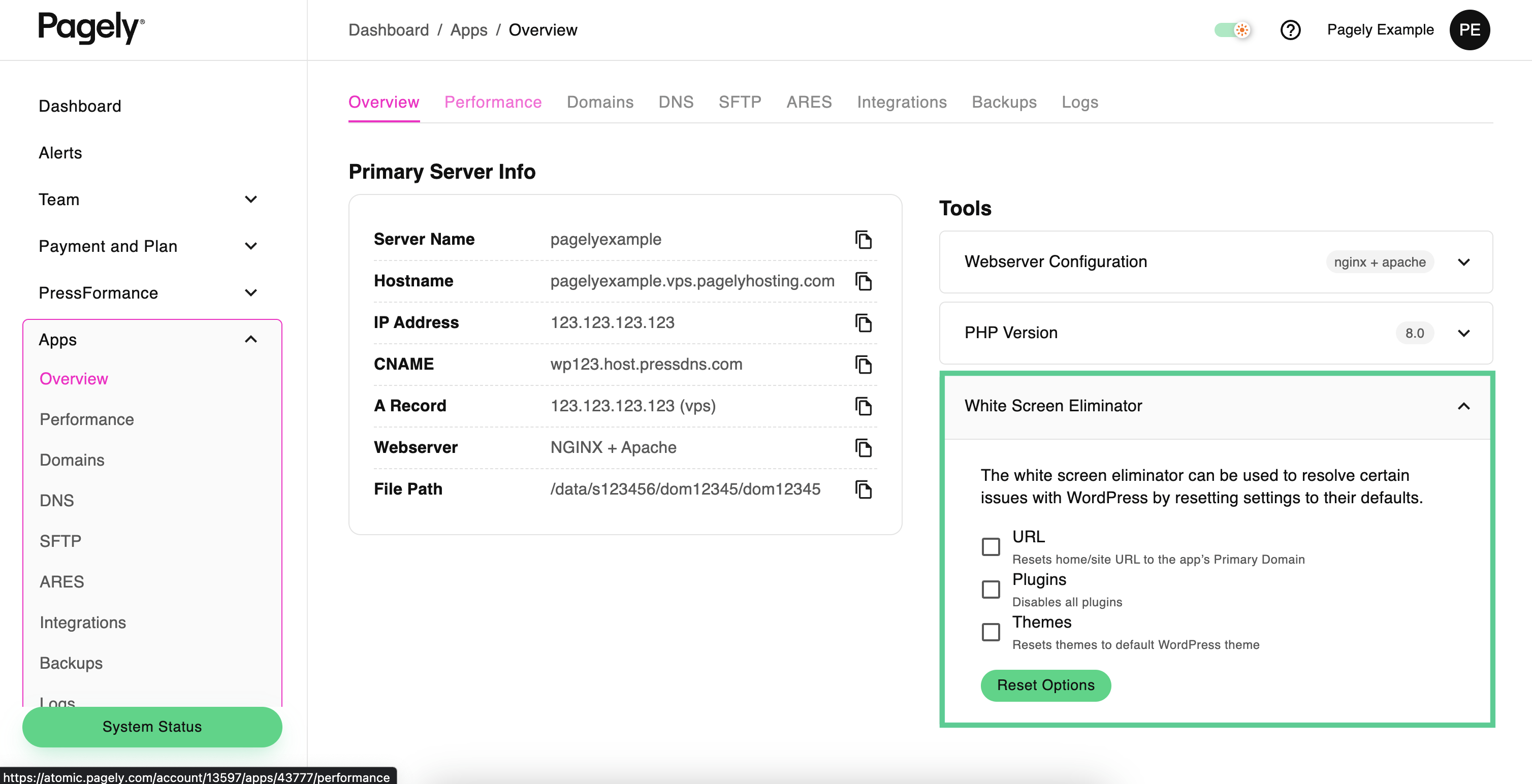
Hostinger offers over 100 one-click installations which significantly reduce setup time and complexity for newbies and experienced users alike. Automated updates and AI tools contribute to a seamless user experience. Pagely, while requiring a setup time of about a day, focuses on managed WordPress hosting. It offers efficient command-line tools and staging environments but may appear more technical to the average user compared to Hostinger’s more approachable interface.
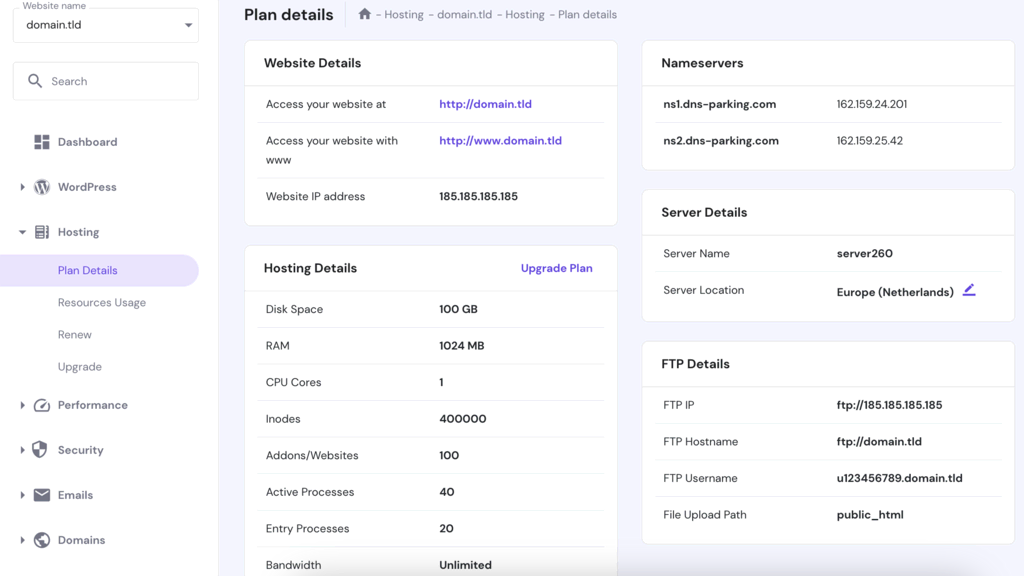
Hostinger provides free automatic website migration, eliminating downtime and simplifying the transition process. This tool is a substantial benefit for those who want to move their site without additional costs or complexities. Pagely’s migration tool involves a more manual process through support channels like tickets and chat, requiring more user involvement and potentially incurring additional time.
The platforms provide extensive knowledge bases filled with guides, how-to articles, and instructional content. Hostinger boasts 24/7 multilingual support, video tutorials via Hostinger Academy, and a rich library of guides covering various aspects of web hosting. Pagely also offers a comprehensive support and knowledge base, including detailed articles and quick start guides, but relies on ticket-based support.
User management
accessibility.
Score Components:
- Role customization (40%): Flexibility in creating and defining user roles and
permissions. - Ease of management (30%): User interface and tools for managing users.
- Access control (20%): Effectiveness of access control measures for different user
levels. - Scalability (10%): Ability to manage a growing number of users efficiently.
 8.2
8.2
 8.4
8.4
🏆 Winner Pagely: High-performance hosting with extensive user role management capabilities.
Hostinger and Pagely both offer structured and detailed systems for managing user roles and permissions. Hostinger’s approach to user roles centers around client onboarding and access levels that primarily differentiate between managing services and making purchases. Pagely, on the other hand, provides a more granular approach with multiple specific roles such as Account Owner, Super-Admin, and various technical and app-specific roles. This makes Pagely more flexible for organizations requiring detailed access control across different levels of their operations.
In terms of user interfaces and tools, Hostinger uses its hPanel to allow users to manage websites, add clients, and handle domains efficiently. The hPanel provides centralized service management and an intuitive interface. Pagely offers a similar but more intricate interface that includes detailed account and site-level controls, as well as management for 2-factor authentication and SSH/SFTP key handling. Both platforms are user-friendly, but the complexity in Pagely’s toolset might appeal more to advanced users.
Assessing access control measures, Hostinger has clear restrictions on what users with granted access can and cannot do. It ensures that access is tightly controlled to safeguard the account owner’s interests. Pagely’s roles, especially ones like Tech and Billing, allow precise control over user activities and are effective for organizations managing a larger number of users. Pagely’s detailed roles cater well to growing teams with diverse access needs, while Hostinger’s simpler model is efficient for smaller setups.
Hostinger User Roles Table:
| Role | Description | Access Highlights |
|---|---|---|
| Manage services | Modify files and websites, manage VPS | Cannot purchase services, invite users, manage payments, or delete the account |
| Manage services and make purchases | In addition to managing services, can purchase new hosting plans | Cannot manage payments, invite users, manage profile information, or delete the account |
Pagely User Roles Table:
| Role | Description | Access Highlights |
|---|---|---|
| Account Owner | Full management of the account | Manage billing, users, sites, and enforce 2FA |
| Super-Admin | High-level management | Similar to Account Owner but without billing authority |
| Sub-Admin | Admin-level but less than Super-Admin | Can manage sites and users but not billing |
| Tech | Technical management | Site and 2FA management, SSH/SFTP access |
| Billing | Financial management | Limited to billing, no site management |
| App-Only | Application-level access | Manage account 2FA, SSH/SFTP, and access backups |
| App-Only-Minimal | Minimal application-level access | Basic 2FA and SSH/SFTP handling without site management |
Customer support
hosting provider.
Score Components:
- Support communication channels (30%): Measures the variety of customer support types
provided (live chat, chatbot, email, phone, etc.) - Availability (20%): Assesses the availability hours for each channel, including 24/7
support options. - Technical support quality (30%): Assesses whether the provider offers comprehensive
technical support, including hardware upgrades (e.g., HDD to SSD), software installations, and web
server configuration changes. - Enterprise support (20%): Checks if there are dedicated or priority support services
for enterprise-level customers.
 8.3
8.3
 8.9
8.9
🏆 Winner Pagely: With a high customer satisfaction rate and tierless support, Pagely offers a strong support system for its users.
 |
 |
|
|---|---|---|
Phone support |
||
Live chat support |
||
Chatbot |
||
Email/ticket support |
||
Enterprise support (dedicated agent, priority support) |

Hostinger and Pagely both provide excellent customer support, but their approaches vary slightly. Hostinger offers 24/7 live chat support and a comprehensive knowledge base, including video tutorials via Hostinger Academy. Hostinger also provides multilingual support and has various email addresses for specific issues like account recovery and abuse reporting. Additionally, they offer priority support for higher-tier plans and respond to general issues impressively within three minutes.
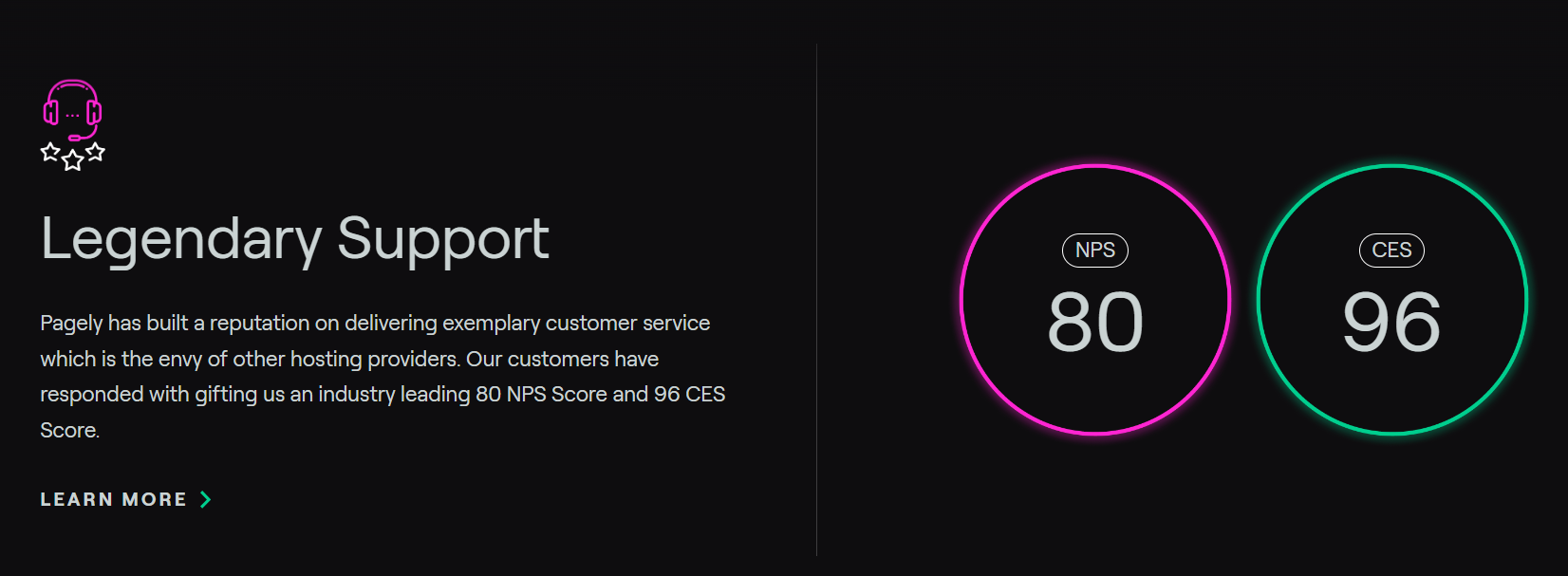
Pagely, on the other hand, features 24/7 live chat and ticket support with a unique tierless system where every support member can resolve issues without escalation. Adding to its strengths, Pagely also offers a dedicated Slack channel during business hours (PST) and phone support for select plans. Pagely excels in customer satisfaction, boasting a high percentage of cases resolved within two hours and an impressive Net Promoter Score (NPS). It also includes an onboarding process for most plans, further enhancing its customer service experience.
User feedback
Hostinger receives high praise for its user-friendly interface, competitive pricing, and robust performance. Customers appreciate the wide range of features, including seamless website migration, the intuitive hPanel, and excellent uptime. The standout feature, consistently mentioned across reviews, is the exceptional and responsive customer support available 24/7 via live chat, although some users express a desire for phone support. On the downside, a few customers report issues with renewal pricing, occasional slow support response times, and the limitations of the lower-tier plans.
Overall, Pagely receives high praise from its users for its reliable and efficient WordPress hosting services. Reviewers particularly commend the exceptional and responsive customer support, likening it to having an on-call DevOps team. While the service is considered expensive compared to other hosting providers, users generally agree that the quality and peace of mind it offers are well worth the cost. Minor criticisms include the premium pricing and occasional interface bugs, but these are overshadowed by the consistently positive experiences with uptime, security, and problem resolution.
FAQ
Which platform is better suited for hosting WordPress websites?
Both Hostinger and Pagely are well-suited for hosting WordPress websites. Hostinger offers user-friendly WordPress features, making it accessible for beginners, while Pagely leverages AWS infrastructure for high-performance and scalable solutions tailored to enterprise needs. The choice depends on specific user requirements, budgets, and performance needs.
Which hosting service offers better security features?
Pagely offers more comprehensive security features with advanced measures such as AWS Shield Standard DDoS protection, a proprietary web application firewall, and compliance with HIPAA and PCI standards. Hostinger provides robust security with DDoS protection, Imunify360, and daily backups, but Pagely’s extensive security framework is better suited for enterprise-level requirements.
What are the major differences in pricing and value between Hostinger and Pagely?
Hostinger provides budget-friendly plans starting as low as $1.99/mo with features like free domains and SSL certificates, making it suitable for small to medium-sized businesses. Pagely targets enterprise clients with prices starting at $199/mo, offering advanced scalability, managed services, and robust support. Hostinger is more cost-effective for general users, whereas Pagely is ideal for those needing high-end features and dedicated resources.
Which hosting service offers more scalability options for growing websites?
Both Hostinger and Pagely offer scalable solutions but cater to different user needs. Hostinger’s plans are straightforward and affordable, making it easy for businesses to scale up as they grow. Pagely offers custom scalability with high-tier plans, featuring flexible configurations and dedicated resources, making it suitable for enterprises requiring advanced scalability.
Which platform offers better customer support?
Pagely offers superior customer support with a tierless system where every support member can resolve issues without escalation. It includes 24/7 live chat and ticket support, a dedicated Slack channel, and phone support for select plans. Hostinger also provides 24/7 multilingual live chat support and a comprehensive knowledge base, but Pagely’s high customer satisfaction and specialized support offerings make it stand out.
The making of this blog
We followed a clear, step-by-step process to write and research this article.









